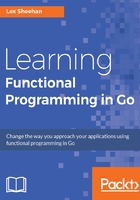
A time of reckoning
Why would we want to use pure FP in Go? If writing expressive, easy-to-maintain, and insightful code is more important than performance, then perhaps.
What are our alternatives? Later, we'll look at some pure FP libraries that have done the heavy lifting for us and have made strides toward being more performant.
Is that all there is to functional programming in Go? No. Not by a long shot. What we can do with FP in Go is currently partially limited by the fact that the Go compiler currently does not support TCO; However, that may change soon. For details see the How to Propose Changes To Go section in the Appendix.
There is another aspect to functional programming that Go fully supports: function literals. And as it turns out, that is the single most important characteristic that a language must have to support FP.
Function literals: These are functions that are treated as first-class citizens of a language, for example, any variable type, such as int and string. In Go, functions can be declared as a type, assigned to variables and fields of a struct, passed as arguments to other functions, and returned as values from other functions. Function literals are closures, giving them access to the scope in which they are declared. When function literals are assigned to a variable at runtime, for example, val := func(x int) int { return x + 2}(5), we can call that anonymous function a function expression. Function literals are used in lambda expressions along with currying. (For details about lambda expressions, see Chapter 10, Functors, Monoids, and Generics.)